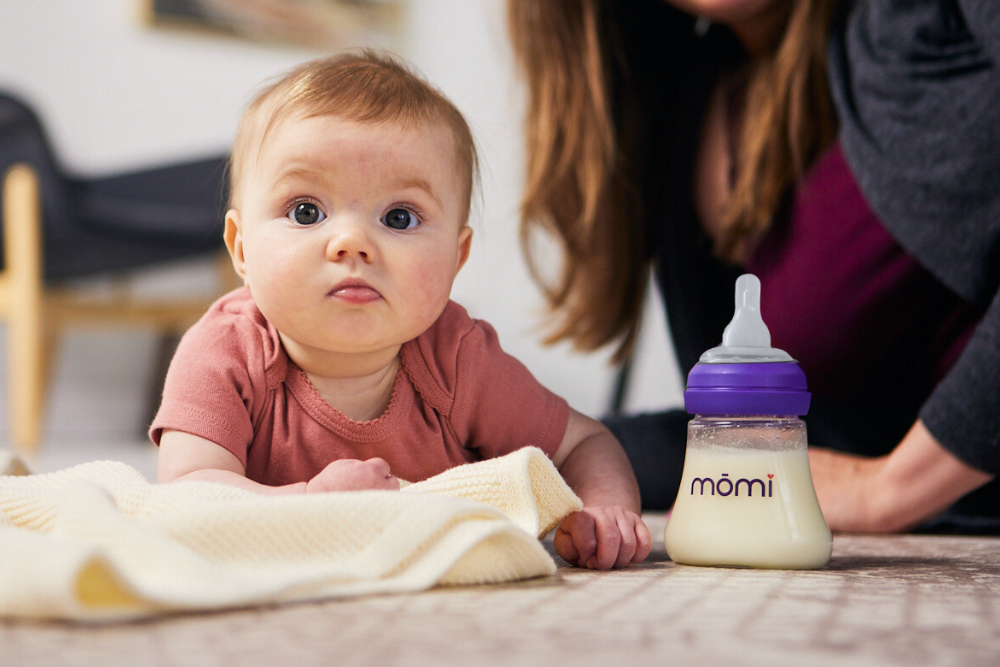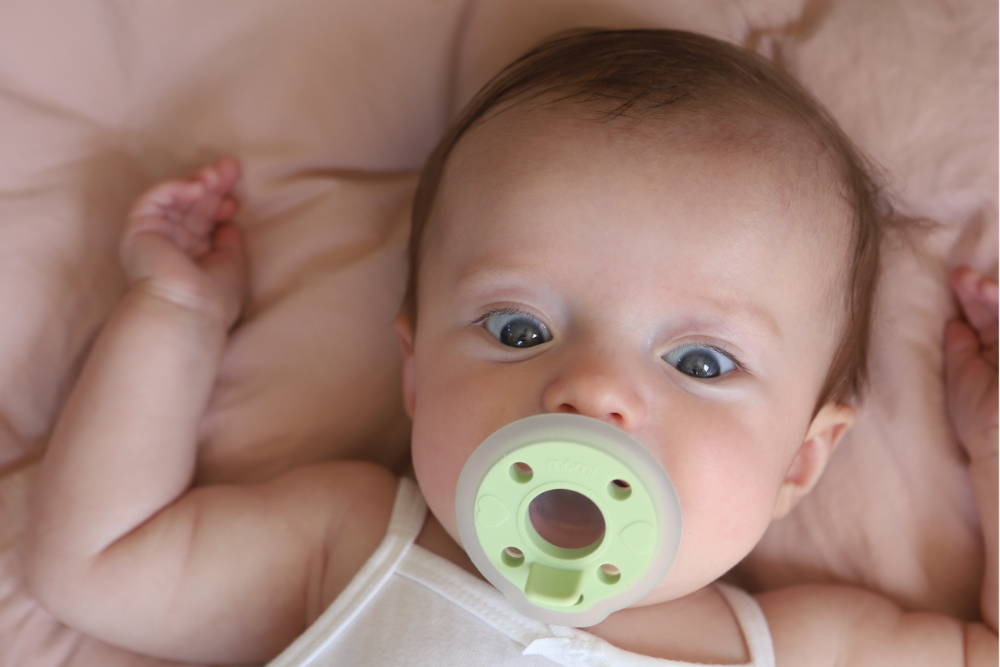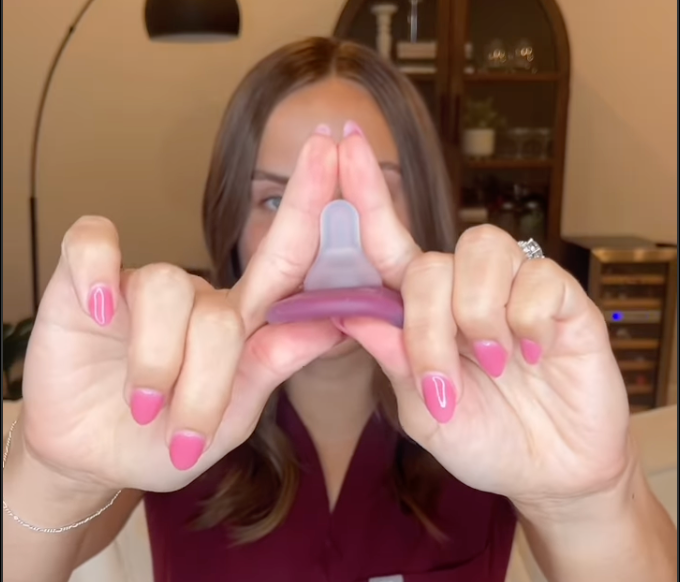Has your baby taken a bottle happily — but suddenly started refusing? You’re not alone. Many parents notice bottle refusal around 3–4 months old, even if their baby previously fed indiscriminately from breast and bottle. While it can be stressful (especially for parents facing a return to work), this phase is common and often temporary.
why do babies start refusing bottles?
Several factors can play a role, especially around three to four months:
- developmental changes: Babies at this age are more alert and easily distracted. They also begin to feed more intentionally—choosing when and how to eat instead of relying solely on newborn reflexes.
- breast preference: Babies primarily nursing at the breast may prefer its familiar comfort, scent, and warmth.
- flow preference: As babies grow, they may begin to exert preference for a specific flow rate. Sudden changes can be frustrating.
- timing and hunger cues: Hunger patterns shift around this age. If you miss a baby’s “sweet spot” (the window where they’re hungry before they’re overly frustrated), they may reject the bottle.
- teething or oral discomfort: Sore gums can make sucking painful. If you suspect teething or oral issues, check in with your pediatrician.
how to help a baby accept the bottle again
Here are some tried-and-true strategies that can make a big difference:
- check the nipple flow rate. Too slow? Baby may get frustrated. Too fast? They may gag or pull off. Choose one flow rate and stick with it consistently so your baby knows what to expect.
- experiment with positions and environment. Try feeding in a quiet, dimly lit room to minimize distractions. If that doesn’t help, offer the bottle while walking, rocking, or holding baby semi-upright facing outward.
- offer when baby is calm. Right after a nap or before they’re overly hungry can work well. Calm and curious is the vibe you’re aiming for.
- play with milk temperature. Some babies prefer milk warmer (close to body temperature); others like it cooler. Try warming the nipple under warm water before feeding, or offering milk straight from the fridge to see what your baby prefers.
- try a “dream feed.” Offer the bottle when baby is drowsy or just waking up—when they’re less aware of distractions.
- introduce a pacifier that supports healthy feeding mechanics. Some parents find that letting baby practice with a pacifier designed to support healthy feeding—like the mōmi babypace® pacifier—helps babies more readily accept the bottle again. This gentle practice reinforces tongue and jaw coordination similar to nursing.
- be consistent but gentle. Daily low-pressure practice works best. Forcing a feeding usually backfires. Let baby mouth or play with the nipple without pressure to feed.
what’s going on developmentally?
Newborns feed mostly by reflex—like rooting when something brushes their cheek. By 3–4 months, babies become more coordinated and aware of feeding. They notice:
- Flow rates
- Textures
- Temperatures
- Their own tongue and jaw movements
This increased awareness is normal and can make babies more particular about how and when they feed.
practical tips for parents
- Be patient and keep practice sessions relaxed.
- Offer the same bottle brand for a while to build familiarity (we recommend mōmi bottles—but whichever you choose, consistency matters).
- Avoid forcing the bottle—let baby mouth the nipple and explore it if that’s what they’re inclined to do.
- Try different feeding angles and positions. Now that baby has more head control and awareness of the world, they may prefer a new position or environment—either calmer or more stimulating.
when to seek professional help
If your baby consistently refuses bottles and you’re concerned about weight gain or hydration, consult your pediatrician or an IBCLC (International Board Certified Lactation Consultant) right away.
If your baby’s bottle refusal is interfering with your ability to work or is detrimental to your mental health, find support with a lactation consultant or pediatric occupational therapist who specializes in bottle refusal.
key takeaway
Bottle refusal around 3–4 months is common and often a sign of normal development—not something you’re doing wrong. With patience, consistency, and the right strategies, most babies return to taking bottles comfortably.
faq
q1: can i prevent bottle refusal?
If an occasional bottle is important to your lifestyle or feeding goals, or you know that baby will bottle feed when you return to work, there are a few things you can do:
- Treat bottle feeding like other skills, and practice with baby.
- Introduce the bottle early, while baby is still feeding based on reflexes (but after breastfeeding is well established).
- Be consistent.
- Remember there’s help—some IBCLCs and pediatric OTs specialize in overcoming bottle refusal and combination feeding. Don’t wait too long for a consult if you’re worried.
q2: is it normal for a 3-month-old to suddenly refuse bottles?
Yes, many babies start refusing bottles around 3–4 months due to developmental changes, distraction, or preference for breastfeeding. It’s common and usually temporary.
q3: how can i get my baby to take a bottle again?
Experts view bottle feeding as a skill and recommend frequent practice if you’ll rely on bottles for work or occasional feeds. Try consistent daily practice in a calm setting, experiment with positions, check milk temperature, and consider consulting with an IBCLC for expert guidance.
q4: should i change the bottle nipple flow if my baby is refusing the bottle?
Sometimes, but not always. If the nipple flow is too slow, babies may get frustrated. Too fast and they may gag. Pick one flow and stick with it for consistency.
q5: when should i worry about bottle refusal?
If your baby refuses bottles consistently and you’re worried about your mental health or your baby’s hydration or weight gain, consult your pediatrician or an IBCLC right away.



